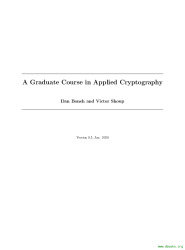A Graduate Course in Applied Cryptography
While extremely useful, cryptography is also highly brittle. The most secure cryptographic system can be rendered completely insecure by a single specification or programming error. No amount of unit testing will uncover a security vulnerability in a cryptosystem.
Instead, to argue that a cryptosystem is secure, we rely on mathematical modeling and proofs to show that a particular system satisfies the security properties attributed to it. We often need to introduce certain plausible assumptions to push our security arguments through.
This book is about exactly that: constructing practical cryptosystems for which we can argue security under plausible assumptions. The book covers many constructions for different tasks in cryptography. For each task we define a precise security goal that we aim to achieve and then present constructions that achieve the required goal. To analyze the constructions, we develop a unified framework for doing cryptographic proofs. A reader who masters this framework will be capable of applying it to new constructions that may not be covered in the book.
Table of contents
- Secret key cryptography
- Introduction
- Encryption
- Stream ciphers
- Block ciphers
- Chosen plaintext attacks
- Message integrity
- Message integrity from universal hashing
- Message integrity from collision resistant hashing
- Authenticated encryption
- Public key cryptography
- Public key tools
- Public key encryption
- Chosen ciphertext secure public-key encryption
- Digital signatures
- Fast signatures from one-way functions
- Elliptic curve cryptography and pairings
- Post-quantum cryptography: lattices and isogenies
- Analysis of number theoretic assumptions
- Protocols
- Protocols for identification and login
- Identification and signatures from sigma protocols
- Proving properties in zero-knowledge
- Modern proof systems
- Authenticated key exchange
- Two-party and multi-party secure computation
- Basic number theory
- Basic probability theory
- Basic complexity theory
- Probabilistic algorithms
| Pages : | 900 |
| Size : | 9.5 MB |
| File type : | |
| Downloads: | 165 |
| Created: | 2022-02-01 |
| License: | Out of Copyright |
| Author(s): | by Dan Boneh, Victor Shoup |

Warning: Trying to access array offset on false in /home/tutovnfz/public_html/article.php on line 233
Others Computer science Tutorials
Handbook on Craniofacial Superimposition
Others related eBooks about A Graduate Course in Applied Cryptography
Building Secure and Reliable SystemsCan a system be considered truly reliable if it isn't fundamentally secure? Or can it be c..., download free Secure Systems tutorial in PDF (558 pages) created by Piotr Lewandowski ....
A Gentle Guide to Constraint Logic Programming via ECLiPSe, 3rd EditionThe book is an introductory and down-to-earth presentation of Constraint Logic Programming (CLP), an exciting software paradigm, more and more popular for solving combinatorial as well as continuous constraint satisfaction problems and constraint optimization problems. It is based on the popular, ...
Intel Xeon Phi Coprocessor Architecture and ToolsDownload free course Intel Xeon Phi Coprocessor Architecture and Tools, pdf file on 220 pages by Rezaur Rahman....
Think StatsDownload free course Think Stats, pdf file on 264 pages by Allen Downey....
MongoDB Notes for ProfessionalsDownload free course MongoDB Notes for Professionals, pdf file on 72 pages by Stack Overflow Community....
Jenkins: The Definitive Guide: Continuous Integration for the MassesThis book teaches you how to automate your build, integration, release and deployment process with Jenkins, the popular Java-based open source tool that has revolutionized the way teams think about continuous integration (CI). This concise guide shows you how to seamlessly include Jenkins in the d...
The Next.js HandbookDownload free course The Next.js Handbook, pdf file on 102 pages by Flavio Copes....
SAP Tutorial free PDFDownload free course SAP Tutorial free PDF, pdf file on 2 pages by tutorialkart.com....
Haskell tutorial for professionalsDownload free Haskell tutorial course in PDF, training file in 78 chapters and 230 pages. Free unaffiliated ebook created from Stack OverFlow contributor....
Foundations of Software Science and Computation StructuresDownload free course Foundations of Software Science and Computation Structures, pdf file on 556 pages by Miko?aj Boja?czyk, Alex Simpson....